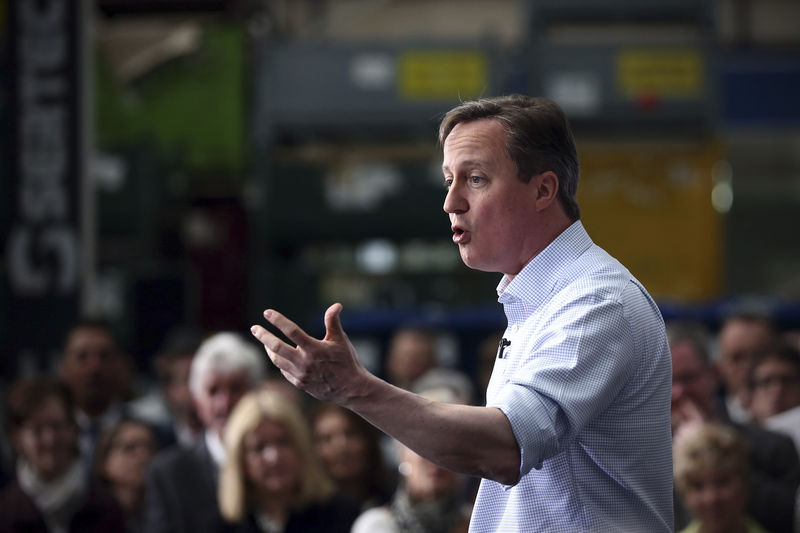By Andrew Osborn and William Schomberg
(Reuters) - British Prime Minister David Cameron courted voters on Wednesday by promising a new law to prevent tax increases for five years if he is re-elected on May 7, a move instantly dismissed as a gimmick by other political parties.
Cameron, seeking to break a deadlock in opinion polls with just eight days to go before election day, said Britons should be allowed to keep most of what they earn.
"You've paid enough tax," he said in a speech. "It's time for waste in government to go. It's time for reform of welfare. It's not time for higher taxes on working people."
Despite Britain's large budget deficit, Cameron's Conservative Party committed in its policy manifesto published earlier this month to no increases in income tax, national insurance or value-added sales tax (VAT).
Cameron went a step further on Wednesday with the pledge to enshrine the commitment in law within 100 days of winning power.
But the chances of such a law ever passing are slim.
The Liberal Democrats, the Conservatives' coalition partners for the last five years and who could be kingmakers again, slammed the plan.
"This is yet another gimmick from David Cameron to deflect attention from the fact that the Tories have abandoned the plan followed by the coalition and instead want to slash and burn support for millions of families," a party spokesman said.
Britain has halved its budget deficit over the past five years but at just under 5 percent of economic output, it remains one of the biggest among the world's rich economies.
The Conservatives plan to fix the public finances by further cuts to spending, including big and largely unspecified cuts to welfare.
The Liberal Democrats say the pain should be shared between spending cuts and taxes.
Last week, the Institute for Fiscal Studies, a respected independent think tank, said the Conservatives' plans to eliminate the budget deficit by 2019 might mean they have to raise taxes as well as cutting spending.
The opposition Labour Party, which is running neck-and-neck with the Conservatives in opinion polls, said Cameron would only be able to make his sums add up by cutting tax credits which have supported incomes for lower earners.
Ed Balls, Labour's finance spokesman, said Cameron could not be trusted on taxes after the Conservatives went into the 2010 election saying they had no plans to raise VAT, which they did shortly after taking power.
Labour plans to increase the top rate of income tax if it comes to power but leave other taxes at their current level.
Britain's economy has returned to the centre of campaigning after official data on Tuesday showed economic growth in the first three months of this year was its slowest since late 2012, when the country was at risk of slipping back into recession.
Cameron's camp had been banking on the economic recovery to return him to office, contrasting the Conservatives' solid financial stewardship with the "chaos" of left-wing Labour.
But sluggish real wage growth and Labour's focus on living standards have blunted the impact of that message, as have a series of last-minute spending promises by the Conservatives.
Data on Wednesday showed consumer confidence fell to its lowest level since December, according to one measure, while retail sales growth softened unexpectedly.
